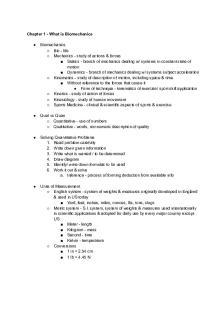Exam 1 Study Guide - Jane Himarios PDF

| Title | Exam 1 Study Guide - Jane Himarios |
|---|---|
| Author | Harsh Drolia |
| Course | PRINCIPLES OF MACROECONOMICS |
| Institution | The University of Texas at Arlington |
| Pages | 2 |
| File Size | 31.8 KB |
| File Type | |
| Total Downloads | 74 |
| Total Views | 139 |
Summary
Jane Himarios...
Description
PHIL 2300 Exam 1 Study Guide Exam date: February 20 Part 1 of the exam will consist of 25 multiple choice and true/false questions. Bring Scantron form 882-E. Review the following: 1. Socrates in the Apology 2. Socratic method 3. Socrates’ central teachings 4. Reduction ad absurdum argument 5. Inductive vs. deductive arguments 6. Validity and soundness 7. Strength and cogency 8. Apriori vs aposteriori knowledge 9. Skepticism 10. Descartes’ method of doubt 11. What Descartes doubted and why 12. Universal belief falsifier 13. Basic beliefs of rationalism 14. Plato’s Forms 15. Plato’s theory of recollection 16. Descartes’ proof for the existence of God 17. Basic beliefs of empiricism 18. Locke’s primary and secondary qualities 19. Locke’s simple and complex ideas 20. Hume’s relations of ideas vs. matters of fact 21. Hume on causation 22. Hume’s skepticism
In Part 2 of the exam, you will be asked to write an essay. I will choose the essay prompt from the questions below. Your essay should be four to five paragraphs long. 1. In the Apology, Socrates defends himself against charges of corrupting the youth and impiety. In the course of his speech, he does not seem to prioritize receiving an acquittal or negotiating a lighter sentence. What do you think he is trying to achieve with his speech? Drawing from your knowledge of Socrates’ philosophical beliefs, use examples from the dialogue to argue in support of your view. 2. Considering Descartes’ overall project in the Meditations, do you think that his proof for the existence of God is successful? Argue in support of your view. In answering this question, be sure to state the proof we covered from Meditation
3, explain the role of clear and distinct principles, and explain the objection that Descartes is using circular reasoning. 3. Explain the three anchor points of rationalism and use examples from Plato and Descartes to illustrate them. Considering objections posed by empiricists, critically evaluate this position. Do you agree with rationalism? Why or why not? 4. Explain the three anchor points of empiricism, and use examples from Locke and Hume to illustrate them. Do you agree with empiricists that the senses are our only source of knowledge? If the senses were the only source of knowledge, do you think that knowledge of the world would be possible? Argue in support of your views....
Similar Free PDFs

Exam 1 Study Guide
- 1 Pages

exam 1 study guide
- 5 Pages

Exam 1 study guide
- 6 Pages

Exam 1 Study Guide
- 6 Pages

Exam 1 Study Guide
- 12 Pages

Study Guide Exam 1
- 9 Pages

EXAM 1 Study Guide
- 3 Pages

Exam 1 Study Guide
- 14 Pages

Exam 1 study guide
- 21 Pages

Exam 1 study guide
- 13 Pages

Study guide Exam 1
- 24 Pages

Exam 1 study guide
- 5 Pages

Exam 1 Study Guide
- 2 Pages

Exam 1 Study Guide
- 17 Pages

Exam 1 Study Guide
- 4 Pages
Popular Institutions
- Tinajero National High School - Annex
- Politeknik Caltex Riau
- Yokohama City University
- SGT University
- University of Al-Qadisiyah
- Divine Word College of Vigan
- Techniek College Rotterdam
- Universidade de Santiago
- Universiti Teknologi MARA Cawangan Johor Kampus Pasir Gudang
- Poltekkes Kemenkes Yogyakarta
- Baguio City National High School
- Colegio san marcos
- preparatoria uno
- Centro de Bachillerato Tecnológico Industrial y de Servicios No. 107
- Dalian Maritime University
- Quang Trung Secondary School
- Colegio Tecnológico en Informática
- Corporación Regional de Educación Superior
- Grupo CEDVA
- Dar Al Uloom University
- Centro de Estudios Preuniversitarios de la Universidad Nacional de Ingeniería
- 上智大学
- Aakash International School, Nuna Majara
- San Felipe Neri Catholic School
- Kang Chiao International School - New Taipei City
- Misamis Occidental National High School
- Institución Educativa Escuela Normal Juan Ladrilleros
- Kolehiyo ng Pantukan
- Batanes State College
- Instituto Continental
- Sekolah Menengah Kejuruan Kesehatan Kaltara (Tarakan)
- Colegio de La Inmaculada Concepcion - Cebu
